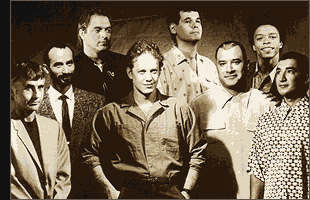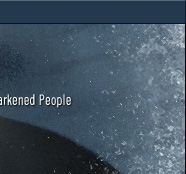Introduction and Main Titles
Daniel Robert Elfman, according to legend, was born in Amarillo, Texas. However it is more likely he was born in the Los Angeles, California area. He spent his youth in the flickering light of a movie theater, where his affinity for film music was born. His musical idols of the time - all film composers: Bernard Herrmann, Franz Waxman, Dimitri Tiomkin, Max Steiner. Despite a career that started with a rock band, Elfman would eventually move into scoring films, where he would not only showcase a talent that payed homage to the film score masters, but to the 1930s bouncing jazz sounds of artists like Cab Calloway and classical composers like Prokofiev and Stravinsky.
His personal tastes for the off-kiler and the bizarre made him a popular choice for the darker edges of cinema, but that reputation as a "dark" composer seemed unearned judging by his credits. His first studio film score was for Tim Burton's Pee-Wee's Big Adventure, where Elfman scored the comic exploits of Pee-Wee with a Nino Rota-like carnival score. Comedy assignments followed -- Back To School, Summer School both of which benefited from Elfman's orchestral scores. His efforts at this point belied his lack of formal musical training. In fact Elfman had not studied composition, orchestration, counterpoint or conducting, instead picking up these skills through trial and error, and by simply composing. His Oingo Boingo bandmate Steve Bartek was along for the ride, acting as Elfman's orchestrating, making sure that Danny got from the orchestra what he wanted.
Despite his outsider status in a part of the film industry dominated by traditions, Danny continued to set film music trends. His breezy rock n' roll style score for Midnight Run (1988) inspired a never-ending wave of imitators, but it wasn't until 1989 when Elfman really turned heads, with his towering masterwork for Tim Burton's Batman. It was this score that turned the tide for Elfman, catapulting him into A-list assignments that were often tuned into his sensibilities. It also allowed the composer to work with directors he admired or was interested in. In the early '90s he collaborated with Clive Barker (Nightbreed, 1990), and Sam Raimi (Darkman, 1990). His success with Batman made him a natural choice to score Warren Beatty's Dick Tracy (1990). It was at this point that Elfman had earned his reputation as the darker film composer alternative. Richard Donner's Scrooged (1988), Burton's Beetlejuice (1988) and Edward Scissorhands (1990), all helped solidify the typical Elfman "sound" - an often melancholy mix of gentle choirs and idiosyncratic orchestral writing.
However no biography about Danny Elfman would be complete without first looking at the Oingo Boingo days...

Oingo Boingo: "Willfully weird, slyly cerebral octet..."
Although they never quite achieved the decisive commercial breakthough that was often predicted for them, Oingo Boingo, nonetheless, accomplished quite a lot during their nearly two-decade existence. At a time when "alternative" music had yet to substantially penetrate mainstream media radar, the willfully weird, slyly cerebral octet led by frontman and future A-list film-score composer Danny Elfman made significant inroads into the public conciousness. Winning substantial popularity in and around their hometown of Los Angeles, they made several high-profile  media appearances while building a sizable body of recorded work. The group's catalogue incorporated a manic melange of styles, combining darkly witty lyrics, dizzying herky-jerky rythms and a blaring three-man horn section, all played at breakneck velocity and presided over by the playfully sardonic Elfman.
media appearances while building a sizable body of recorded work. The group's catalogue incorporated a manic melange of styles, combining darkly witty lyrics, dizzying herky-jerky rythms and a blaring three-man horn section, all played at breakneck velocity and presided over by the playfully sardonic Elfman.
Oingo Boingo first arose out of the Mystic Knights of the Oingo Boingo, an avant-garde comedy/music/theatre troupe founded by Danny Elfman's older brother, Richard. During that period he directed the underground cult film Forbbiden Zone, for which Danny provided the music. When the Mystic Knights dissolved in 1978, the younger Elfman, who had previously spent several years in France working with a theater group and studying orchestra, consolidated it's musical elements into a more manageable band format. With a scaled-down name, their new line-up was comprised of himself on vocals and guitar, plus Steve Bartek (lead guitar), Richard Gibbs (keyboard and trombone), Kerry Hatch (bass and vocals), Johnny "Vatos" Hernandez (drums), Sam "Sluggo" Phipps (tenor sax), Leon Schneiderman (baritone sax) and Dale Turner (trumpet).
[Five albums later...] Despite the band's increasing popularity, Oingo Boingo wouldn't release a new album for another two years, due in part to the demands of Elfman's budding career as a film composer. His inventive, eclectic score for director Tim Burton's feature debut, Pee-Wee's Big Adventure, would mark the beginning of a lengthy collaboration between musician and filmmaker.
In 1987, the band returned with Boi-ngo, with Boingo Alive the following year and Dark At The End of The Tunnel in 1990. Their final album was 1994's Boingo (on Giant Records) before officially bidding adieu to its hometown fans with a perforamnce at the Universal Amphitheatre on Halloween in 1995. - Excerpted notes by Scott Schinder (July 2002)

The 1990s... And a New Elfman
The early '90s is perhaps Elfman's most fertile period. Besides the aforementioned Darkman, Nightbreed and Dick Tracy, he also wrote what is perhaps his most popular score for Tim Burton's modern fairy tale Edward Scissorhands. Introducing a theme for choir and celeste, Elfman immediately conjured the emotional resonance of the film, and set a new standard for fantasy scores. He wrote a straight ahead (for the composer) dramatic score for Jon Amiel's post-Civil War era film Sommersby, which found Elfman revising his work to match the shifting tone of the film. Sommersby, with it's arching main theme for lush strings and brass, recalls Ralph Vaughn Williams' epic "Pastoral Symphony" (Symphony #3) and remains one of Elfman's most accesible and popular scores. That same year Elfman would tackle his most ambitious project to date: Tim Burton's Nightmare Before Christmas, the stop-motion animated musical that would feature 10 original Elfman songs and almost non-stop orchestral score. Elfman not only penned the songs and helped shape the film's story, but also provided the singing voice of the film's main character, Jack Skellington. While creatively successful (and now a cult merchandising phenomenon), Nightmare Before Christmas drove a rift between Elfman and Burton that would last until 1996. Called a "family disagreement" that caused the break-up of the collaboration, Burton would hire Howard Shore to score Ed Wood. Strangely enough, a dream Burton had during production on Mars Attacks! convinced him to ask Shore to step aside so that Elfman could score the film instead.
The mid 1990s brought changes to Elfman's "sound". Eschewing the bigger melodies and straight-ahead thrust of Edward Scissorhands, Sommersby, and Black Beauty, Elfman began integrating synth pre-records into his music, often mocking up his scores in his home studio and porting over the percussion and synth tracks into the final mix, with a traditional orchestra performing the rest of the score. The watershed score for this transition is the Hughes Brother's post-Vietnam crime drama Dead Presidents (1995), for which Elfman wrote a thundering, and equally as funk-ified score for a battery of percussion (performed by Elfman), electric guitar, and hammond organ overtop a bed of sawing orchestral strings. Elfman's propulsive main titles set the tone for not only the film, but also his career.
Stepping in to replace Alan Silvestri on Mission: Impossible, Elfman wrote one of his most effective scores in a short amount of time. Continuing the trend set by Dead Presidents, Mission: Impossible was sgnificantly constructed with MIDI-driven percussion rythms, loops and samples. The film was a gigantic hit at the box office, and Elfman was considered the hero. However not all of his summer '96 scores would fare so well. Collaborating with director Peter Jackson on The Frighteners might have been fun for the composer and director, and resulted in an rollicking horror/comedy hybrid score with a sickly dark streak, sadly, the film fizzled at the box office.

The Grand Finale (?) - Coming Soon!!















